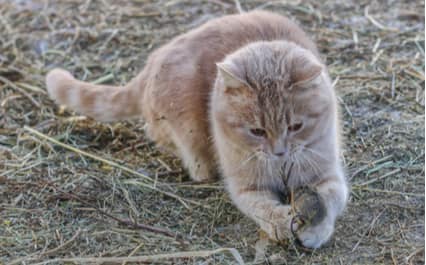
The answer as to whether a cat’s whiskers can grow back is:
A cat’s whiskers can grow back if they are damaged or naturally shed off. This can take about two to three months, or longer for senior cats. Sick cats may not regrow their whiskers until they are cured.
Factors that affect the growth of whiskers are:
- Diet.
- Breed.
- Health issues.
Your cat’s whiskers are important in its life. It can take up to two months for a cat’s whiskers to fully grow back, if trimmed or when they naturally shed off. This article also explains why you should never cut them.
There are many fascinating things about our feline friends, and one of them is their whiskers. As cat owners, we all agree that those stiff hairs poking out beside our cat’s cheeks, add beauty to our feline friends.
Have you ever wondered; what’s the deal with whiskers? In this article, I will give you all the details you need to know about the anatomy of your cat’s whiskers so you understand all the issues about a cat’s whiskers growing back.
Although your cat’s whiskers will naturally grow back if damaged, they should never be trimmed or cut, because they serve a very important role in your cat’s life, as we shall soon see.
Read more, to find out the importance of your cat’s whiskers, and what will happen when they are accidentally cut off.
Your Cat’s Whiskers Will Grow Back if Damaged
There are unfortunate circumstances under which a cat might lose its whiskers, such as through a fight, or a naughty child clipping them. Sometimes their whiskers will naturally fall off.
Although this might be distressing to your cat, their whiskers will eventually grow back. As long as the follicle underneath the skin has not been damaged. It might take up to 2 or 3 months for a full set of whiskers to grow back, and an even longer period for senior cats.
Other cat owners have reported shorter periods of their cats’ whiskers growing back, to about 4 weeks. As you wait for its whiskers to grow back, keep your cat indoors at night, as it now lacks these essential radars to warn it of predators outside.
Different factors that affect the growth of a cat’s whiskers are diet, breeds, or health issues. Sick cats may not regrow their whiskers until they are cured.
Whiskers are Vital in Your Cat’s Life
Certain cat breeds such as the Devon Rex, have long and curly whiskers, which makes trimming so tempting. Do you sometimes feel your cat’s whiskers are unruly, and wonder if they will be damaged if you trim them?
Although men may keep beards to make a fashion statement, your cat’s whiskers have nothing to do with fashion.
Here are valid reasons as to why cutting your furry friend’s whiskers is a big no:
1. Your cat’s whiskers assist it to navigate in the dark

Your cat’s whiskers are a prominent physical feature that gives it athletic ability. They are not like human hair. These long stiff hairs are deeply ingrained in your cat’s body, and act as touch receptors.
The whiskers, also known as vibrissae, are connected to your cat’s muscular and nervous system, helping it to detect any changes in its surroundings.
Whisker trimming as part of the grooming process is a wrong idea. Without its whiskers, your cat cannot make sense of its environment and be alert of potentially dangerous situations.
Cutting or trimming your cat’s whiskers is the same thing as putting a blindfold on a human. This can cause it to feel confused and afraid. Cats who have their cats trimmed will have difficulty judging distances accurately and will stumble upon things at night.
The sensory nerves at the end of your cat’s whiskers, enable it to detect small air movements within its surroundings, even when it is pitch dark. Whiskers located above your cat’s eyes protect it from getting poked by long grasses, or other objects.
2. Whiskers help your cat position its prey

Cats are farsighted. When an object or prey is up close, your cat cannot see it clearly; it needs some way of determining if the prey is in a proper position for that fatal bite.
Your cat’s whiskers serve an important role when it is hunting. These highly sensitive tactile hairs, enable your cat to detect the precise location, and size of the prey.
Its whiskers spread out to detect a larger area when on hunting mode, as this provides it with accurate details of its prey, such as its location, and any of the prey’s slight movement. Without its whiskers, your cat becomes poor in hunting.
This feature also helps your furry friend to know whether or not it can fit into a tight space.
3. Your cat’s whiskers indicate its mood
The whiskers act as a barometer, to help you gauge your cat’s current mood. When your cat is calm or resting, you will notice its whiskers are relaxed and stick out sideways. When your cat is scared or startled, its whiskers will lay flat against its face.
Your cat’s whiskers will point forward when it notices prey, such as a bird. The same happens when you are playing with your cat, and this shows you it is excited about chasing its’ toy prey’.
4. The whiskers go skin-deep, making plucking a painful process
Your cat’s whiskers are rooted deep in its skin, much deeper than its fur. They are also located above its eyes and on its chin, and carry nerve impulses to its brain.
The area around your cat’s whiskers is so sensitive as it has a supply of blood and nerves. Due to this sensitivity, plucking your cat’s whiskers can be painful to your cat.
A tight feeding bowl can also be irritating to your cat as it presses on your cat’s whiskers. Try feeding your kitty on a wide bowl.
Catfight or Health Conditions Cause Whisker Loss
Besides natural shedding, there are other causes behind your cat losing its whiskers. It’s important to protect your cat from unnecessary shedding of its whiskers, because of the reasons stated above.
If your cat is missing a lot of whiskers at once, it might be time to find out what’s going on by going to a vet.
Here are possible reasons why your cat’s whiskers are missing, and what you can do about it.
1. The whiskers fall off during a catfight

Catfights can be nasty, especially during the mating season. If you have a tomcat, you can expect more of these brawls. If your cat is involved in a fight and another cat scratches your cat’s face, its whiskers are likely to fall off.
You can use cat deterrents in your compound to keep strange cats from lurking in your backyard and harming your pet.
You might also consider keeping your cat indoors to save it from all that trouble.
2. Loss of hair is caused by health conditions
One of the main reasons for significant hair loss in a cat, including the whiskers is Alopecia. If your cat is losing both its fur and whiskers, it could be because of this condition.
This disease might interfere with the growth of your cat’s fur including the whiskers. Hair loss in a cat is often caused by an irritation of the skin brought about by bacterial infection, or flea infestations on the skin.
3. Allergies cause whisker loss
Just like us, cats have allergies too. Their allergies are often manifested through skin ailments. Cats may be allergic to food, pollen, shampoos, and parasites. Once you know the cause of the allergy, avoid exposing your cat to these substances.
Check out for red itchy skin on your cat, as this might be an indication of an allergy. If this flare-up happens around your cat’s face, the whiskers might start to fall off. Your cat responds to this skin irritation by excessive licking and rubbing the affected area. Your vet can correctly diagnose the cause of the allergy, and recommend an effective treatment.
It might not be easy to notice your cat has an allergy, because they are so good at hiding their ailment. It might wait until when you are not at home to satisfy their itch. Keep a keen eye on your cat’s behavior to watch out for any signs of discomfort.
Interesting Facts About Your Cat’s Whiskers
- Every cat’s whisker is unique, just like the human fingerprint.
- The cat breed Sphinx has very little or no whiskers.
- Cats use their whiskers to detect odor.
- A cat also has whiskers on the backs of its lower front legs.
- Your cat’s whiskers are three times thicker than their regular hair.
To Wrap Up
If your cat was involved in a fight or has a medical condition and the whiskers fall off, they still can grow back. However, you should never trim them as they can cause your cat to be disoriented, besides other disadvantages, as discussed above.
Your cat’s whiskers should be left alone. It is also important to take your cat to the vet if you notice unexplained whisker loss.

Sources
https://www.petmd.com/cat/behavior/evr_ct_why_do_cats_have_whiskers#
https://www.catster.com/cats-101/cat-whiskers-facts
https://pets.webmd.com/cats/diseases-hair-loss-cats
https://figopetinsurance.com/blog/what-happens-if-cat%E2%80%99s-whiskers-are-clipped